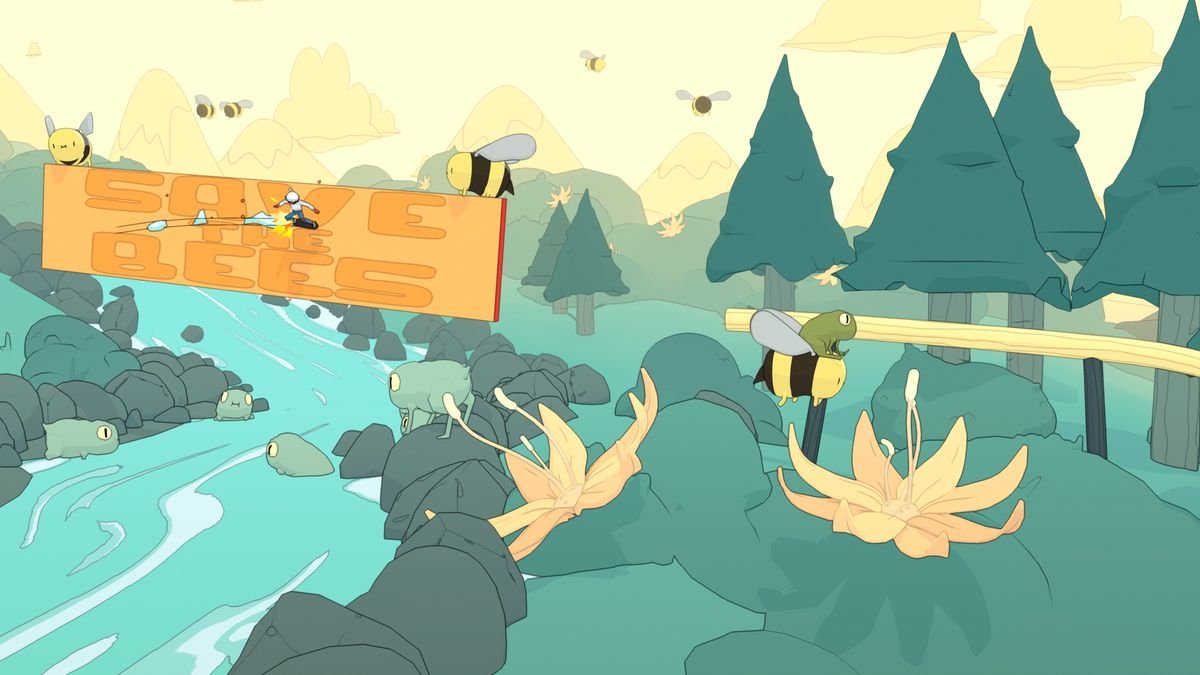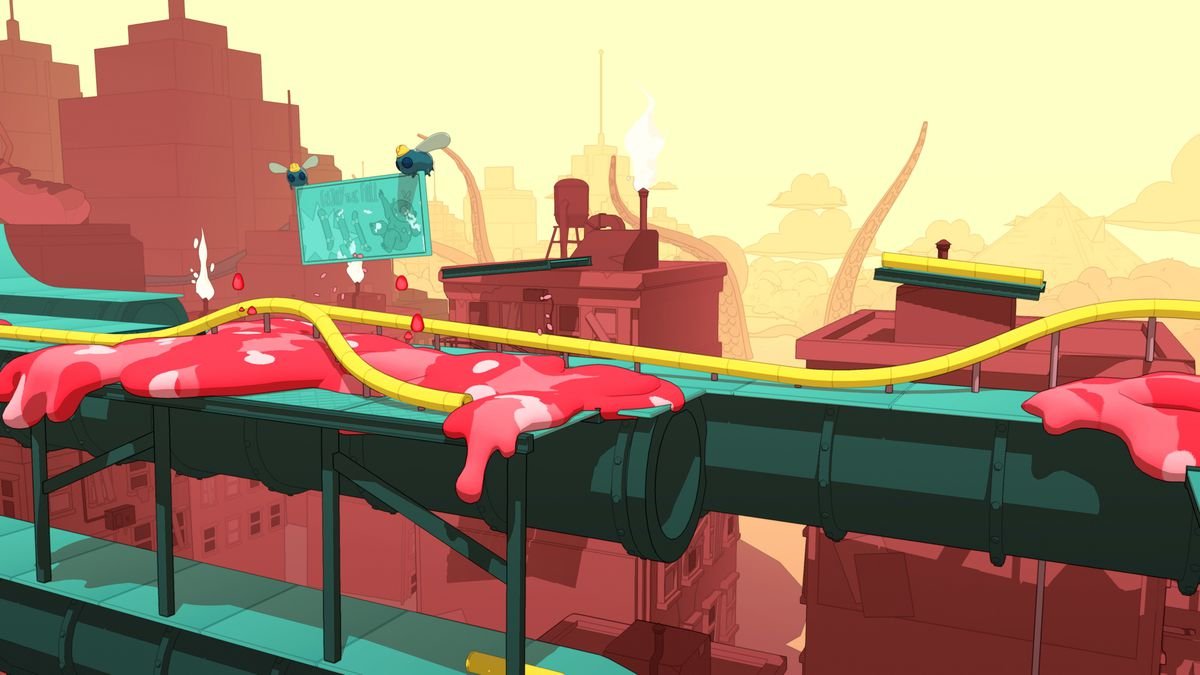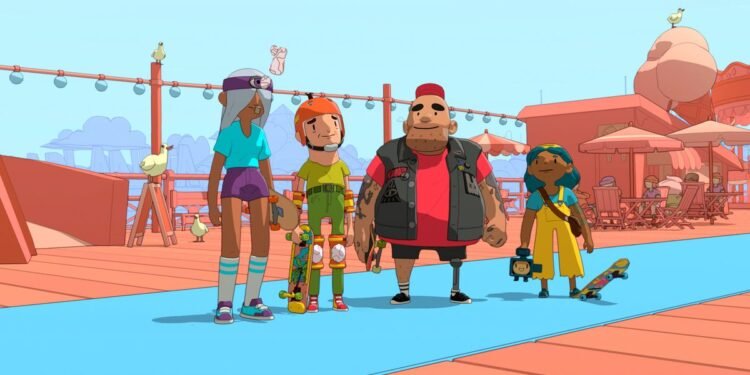I want to ascend to Gnarvana — to meet the gods of skateboarding that built a world around the sport and its culture. I want to prove my skill and become Radlandia’s next Skate Wizard.
In OlliOlli World, the third entry in developer Roll7’s skating series, the current Skate Wizard, Chiffon, is retiring, and the world needs a new link to the skate gods. She and a crew of skaters ride through the world with me to showcase my worth, moving through different skate biomes, including a cotton candy-colored beach; sandy deserts where I grind bones; dense woodlands with friendly bees; and crowded factories where skateboards get made.
OlliOlli World builds on the intense, skill-based gameplay of the first two games, but also widens scope, showcasing how skateboard culture has evolved in recent years. It’s still a game about perfecting a wide skill set, but it’s also a more inclusive experience, in everything from its world to its expansive social options. It’s fantastic, joyous, and at times devastatingly difficult, but not so hard that I ever wanted to stop playing.
With OlliOlli World, Roll7 has pivoted toward a colorful, surrealist art style that’s more similar to Adventure Time than a pixelated Tony Hawk’s Pro Skater. OlliOlli World also uses a 2.5D perspective to allow for things like branching routes and wall-riding. It’s a friendlier take on OlliOlli and OlliOlli 2: Welcome to Olliwood, both of which were punishing in their gameplay. The big difference here is that it’s much harder to outright fail in OlliOlli World; I largely stay on my board unless I’ve crashed into something or fallen into a gap. (Mind you, that still does happen pretty often.)

Image: Roll7/Private Division
The general objective is to simply survive each level, using checkpoints or not, before moving on to the next. But the scalability of scoring and challenges makes the game harder for players that want a more punishing experience. These range from things as straightforward as completing levels without using the checkpoint feature, to hurdles more wacky and challenging, like booping all the frogs along the course or completing a level in a single combo. For me, it’s a nice concession from the controller-breaking gameplay of the first two games, but doesn’t eliminate the need for expert precision entirely.
The thing I love about skateboarding is how it lets me be creative with my body — to use the world around me in ways it wasn’t designed for. OlliOlli World’s wacky environments explode this fantasy to the nth degree: Stairs can be ridden down or soared over, leading into rails that wind like waterslides into ramps and halfpipes — all accessible with a flick of the thumbstick or trigger. The world moves fast: In a matter of seconds you’re doing a stalefish grab over a friendly slime blob with a banana on its head, then wall-riding over a billboard held by giant bees.
OlliOlli World showcases that creativity in its fairly expansive multiplayer and social elements as well. Within each level, I can see leaderboard stats for other players — including a few close to my skill level, deemed my rivals. But I can also watch replays of their runs, to see how they’ve approached these different levels and what tricks landed them their scores. I can watch replays for the top scorers, too.
Once a player’s reached Gnarvana — which unlocks, fittingly, at the end of the game — there are other options for multiplayer skateboarding competitions: the Gnarvana League and the Gnarvana Portal. In the League, OlliOlli World pits me against a group of other players to achieve the highest score. We’re not playing in the same arena, per se, but we are riding the same routes and comparing scores on a leaderboard. For the Portal, I can generate custom runs that I can share with friends. (From there, you can compete for leaderboard spots and watch one another’s runs, too.)

Image: Roll7/Private Division
Skate videos — once on VHS tapes and now on Instagram and YouTube — are such a core part of skateboarding and the evolution of the sport. OlliOlli World’s replay functionality and social elements capture that communal aspect wonderfully. They let me test my skills against those of other players in a productive way — to amplify my own progress by watching them improve as well. The community element of the culture also runs through the single-player narrative: Chiffon and her skate crew travel through these worlds together, and their camaraderie and friendship lend the journey that much more meaning.
As with any skill-based game, it’s easy to get bogged down by the mechanics and forget to smell the roses. Or, in OlliOlli World’s case, to forget to high-five your friends waiting around the course. In most of OlliOlli World, I’m rushing past Roll7’s weird little landscapes, focused more on hitting combinations and scoring big than checking out the sights. But replays allow me to peek at tiny things I missed on my own runs, like aliens dancing in their underpants or ice cream cones lounging on the beach. The visual aesthetic of OlliOlli World and its weird whimsy is just as much of a draw as the precision gameplay. Skateboarding is difficult, and so is this game. But OlliOlli World feels special because it lets me celebrate the sport in a way that suits me personally.
That whimsy never loses its appeal or delight, even as I’m wall-riding myself into gaps or wiping out down sets of stairs. Instead, it amplifies the joy and generosity of a world built on an earnest love of skateboarding.
OlliOlli World will be released Feb. 8 on Nintendo Switch, PlayStation 4, PlayStation 5, Windows PC, Xbox One, and Xbox Series X. The game was reviewed using a Switch download code provided by Roll7. Vox Media has affiliate partnerships. These do not influence editorial content, though Vox Media may earn commissions for products purchased via affiliate links. You can find additional information about Polygon’s ethics policy here.
























































